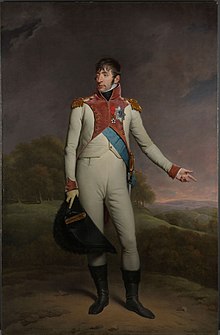Our website is made possible by displaying online advertisements to our visitors.
Please consider supporting us by disabling your ad blocker.
Louis Bonaparte
| Louis Bonaparte | |
|---|---|
 Portrait by Charles Howard Hodges, 1809 | |
| King of Holland | |
| Reign | 5 June 1806 – 1 July 1810 |
| Successor | Louis II |
| Head of the House of Bonaparte | |
| In office 28 July 1844 – 25 July 1846 | |
| Preceded by | Joseph, Count of Survilliers |
| Succeeded by | Napoleon III |
| Born | 2 September 1778 Ajaccio, Corsica, Kingdom of France |
| Died | 25 July 1846 (aged 67) Livorno, Grand Duchy of Tuscany |
| Burial | |
| Spouse | |
| Issue | |
| House | Bonaparte |
| Father | Carlo Buonaparte |
| Mother | Letizia Ramolino |
| Religion | Roman Catholicism |
| Signature | |
Louis Bonaparte (born Luigi Buonaparte; 2 September 1778 – 25 July 1846) was a younger brother of Napoleon I, Emperor of the French. He was a monarch in his own right from 1806 to 1810, ruling over the Kingdom of Holland (a French client state roughly corresponding to the modern-day Netherlands). In that capacity, he was known as Louis I (Dutch: Lodewijk I [ˈloːdəʋɛik]).
Louis was the fifth surviving child and fourth surviving son of Carlo Buonaparte and Letizia Ramolino, out of eight children who lived past infancy. He and his siblings were all born in Corsica, which had been conquered by France less than a decade before his birth. Louis followed his older brothers into the French Army, where he benefited from Napoleon's patronage. In 1802, he married his step-niece Hortense de Beauharnais, the daughter of Empress Joséphine (Napoleon's wife).
In 1806, Napoleon established the Kingdom of Holland in place of the Batavian Republic, appointing Louis as the new king. Napoleon had intended for Holland to be little more than a puppet state, but Louis was determined to be as independent as possible and became quite popular amongst his new people. Growing tired of his brother's wilfulness, Napoleon annexed Holland into the French Empire in 1810, and Louis went into exile.
His youngest son, Louis-Napoléon, established the Second French Empire in 1852, proclaiming himself Napoleon III.
Previous Page Next Page


